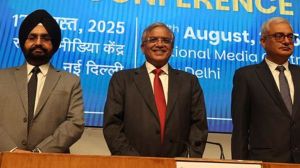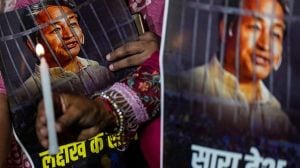High Court rejects SMC staff petition
AHMEDABAD, Aug 19: In A significant judgment, Justice N N Mathur of Gujarat High Court has rejected the petitions of about 61 Surat Munic...

AHMEDABAD, Aug 19: In A significant judgment, Justice N N Mathur of Gujarat High Court has rejected the petitions of about 61 Surat Municipal Corporation employees, who were dismissed from service for remaining absent from duty during the plague outbreak in the city in September 1994. However, he allowed petitions of four employees and directed SMC to reconsider their case within four weeks.
During the plague outbreak, the SMC declared emergency and announced that no employee of essential service will remain absent from duty for 90 days. The employees were asked to resume duty immediately and issued warning that their services will be terminated if they did not report for work.
But some 65 employees remained absent from duty during the crisis. Services of about 70 were terminated on September 25, 1994. But Surat Municipal Staff Union challenged the order. Noticing that no disciplinary action preceded the dismissal orders, the High Court had directed SMC, in an interim order, to consider the facts and circumstances of each case and take a final decision.
But SMC standing committee, after considering the material on record and representation of dismissed employees, confirmed dismissal orders. The standing committee decision was also challenged. It was submitted on behalf of the petitioner union that the dismissal orders were illegal as they were passed without following any procedure or giving any opportunity of hearing.
Besides, sub-clause (3) of Section 56 of Bombay Provincial Municipal Corporation (BPMC) Act puts an embargo on the corporation to dismiss an officer or servant without giving him opportunity of showing cause against dismissal. Also, it was submitted that the requirement of pre-decision hearing cannot be remedied by providing post-decision hearing. Besides, the punishment of dismissal is disproportionate.
But counsel for the SMC submitted that under the provisions of BPMC Act, the requirement of giving hearing opportunity need not be followed in a case where it is reasonably not practicable to give such an opportunity. The situation was so grave that there was no option but to dismiss the service of petitioner employees, it was submitted.
The court observed, "In such a situation when the administration was engaged in saving human life, it was not practicable to hold inquiry against persons who have no sense of duty and sense of service to humanity." Noting that public interest is supreme to private considerations, the court further observed that the employees who fled Surat during plague outbreak had completely forgotten duty and social obligation. "Such persons are not entitled to their livelihood from public exchequer."





- 01
- 02
- 03
- 04
- 05


























